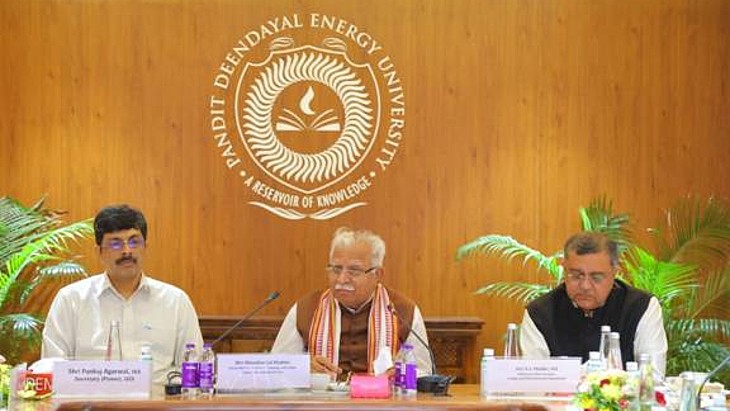The meeting on Monday heard that India currently has 25 operable nuclear energy reactors with a total installed capacity of 8.88 GW, generating about 3% of the country's electricity. Eight more reactors with 6.6 GW capacity are under construction and another 10 units with 7 GW capacity are in pre-project stages. (India often classes two units at Gorakhpur where site works have begun as being under construction, although the first concrete for the reactor buildings has not yet been poured.)
The meeting, which involved members of parliament, was chaired by Manohar Lal Khattar, Minister for Power, who emphasised that hitting the nuclear capacity goal was central to India's goal of reaching net zero carbon emissions by 2070, as well as strengthening India's long-term energy security.
According to the official report of the meeting he said that "as the power sector contributes over 40% of global energy-related emissions, nuclear energy, being a non-fossil and stable power source, will play an increasingly important role in India’s sustainable development journey".
It also sets out the key steps he outlined for the scaling up of nuclear energy capacity:
- Amending the Atomic Energy Act, 1962 and Civil Liability for Nuclear Damage Act, 2010 to enable broader participation by private and state sectors
- Strengthening public perception and enhancing awareness about nuclear energy's safety and benefits
- Facilitating faster land acquisition through brownfield expansions and repurposing retired thermal sites
- Streamlining regulatory approval processes to reduce project timelines
- Introducing tax concessions, green power classification, and long-term financing to ensure competitive nuclear tariffs
- Diversifying technology choices through competitive bidding and promoting indigenous manufacturing under Make in India
- Securing diversified uranium fuel sources and expanding the vendor base for specialised nuclear equipment
- Building skilled manpower capacity by strengthening nuclear education and training infrastructure
The Members of Parliament "actively participated in the discussions and provided valuable suggestions for expediting nuclear power deployment. They stressed the need for faster project execution, creating a favourable public narrative, ensuring technology diversification, and building robust vendor and manpower ecosystems".
The minister told the meeting the Ministry of Power would "work closely with the Department of Atomic Energy, State Governments, industries, and other stakeholders to accelerate the deployment of nuclear power projects and ensure a clean, secure, and sustainable energy future for India".
India's plans for nuclear energy expansion featured in February's edition of the World Nuclear News podcast:















